Mumbai: As coronavirus gnaws its way across India, there has been a paradigm shift in the pattern of healthy living. Each aspect of lifestyle – physical activity, nutrition, sleep, stress, depression, and buying behavior has been affected. GOQii, the smart-tech-enabled preventive healthcare platform conducted a survey across 10000+ Indians to understand how COVID has changed lifestyle and how Indians are adapting to the new normal. This is a comparative study and highlights the glaring difference in lifestyle habits pre-corona and post lockdown.
The last five months have been unexpected and has adversely impacted the health habits of citizens across the length and breadth of India. The situation has taken a major toll on the Mental health of citizens and has become a major talking point in the last few months. With the series of lockdowns, anxiety, job cuts, health scares, and the overall volatile environment, stress levels are at an all-time high. Copious amounts of stress can lead to depression. With the current lockdown and lifestyles drastically changing, we have seen that 43% of Indians are currently plagued with depression and are learning to cope with it. With 26% of Indians facing mild depression, 17% face a more strenuous kind. It is concerning to note that 6% of Indians are severely depressed.
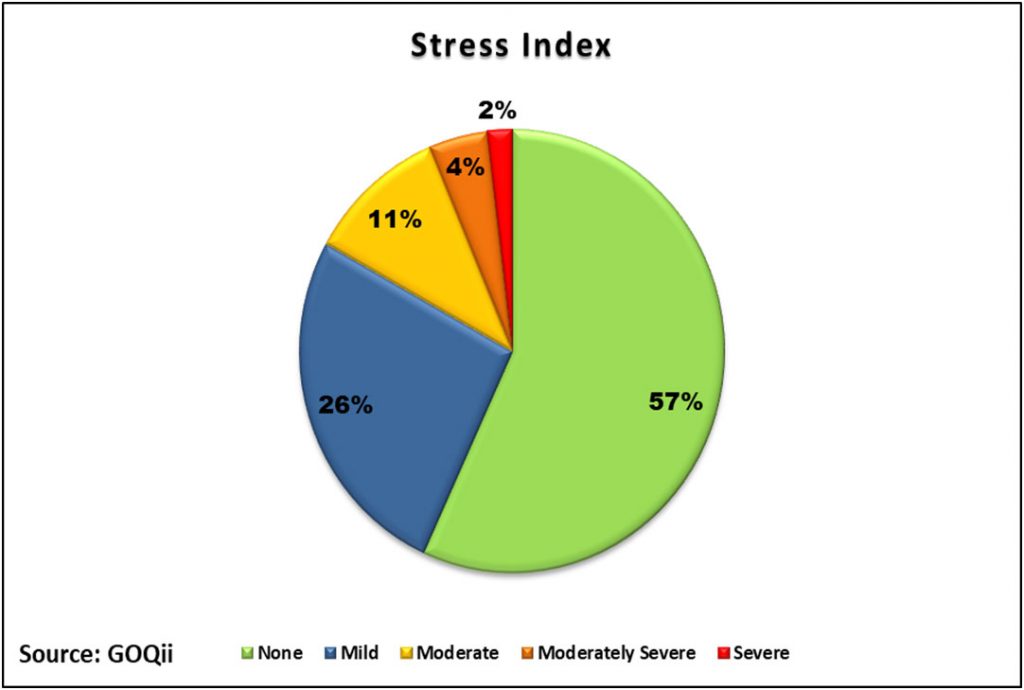
According to the self-administered, Patient Health Questionnaire PHQ – 9, consisting of nine areas it monitors the severity of depression and response in a population.
- little interest or pleasure in doing things
- feeling down, depressed, or hopeless
- trouble falling or staying asleep or sleeping too much
- feeling tired or having little energy
- poor appetite or overeating
- feeling bad about yourself – or that you are a failure or letting people down
- trouble concentrating on things such as reading the newspaper or watching television
- moving or speaking so slowly that other people could have noticed. Or the opposite – being so fidgety or restless more than usual
- thoughts that you would be better off hurting yourself in some way
As per the study, a large section of the population has little interest in doing things in the current scenario. There is a cause of concern with more than 59% of the population having little pleasure in doing things these days, out of which 38% have this feeling on a few days and 9% feel so more than half of the days. 12% of the population has little interest almost every day in these times.

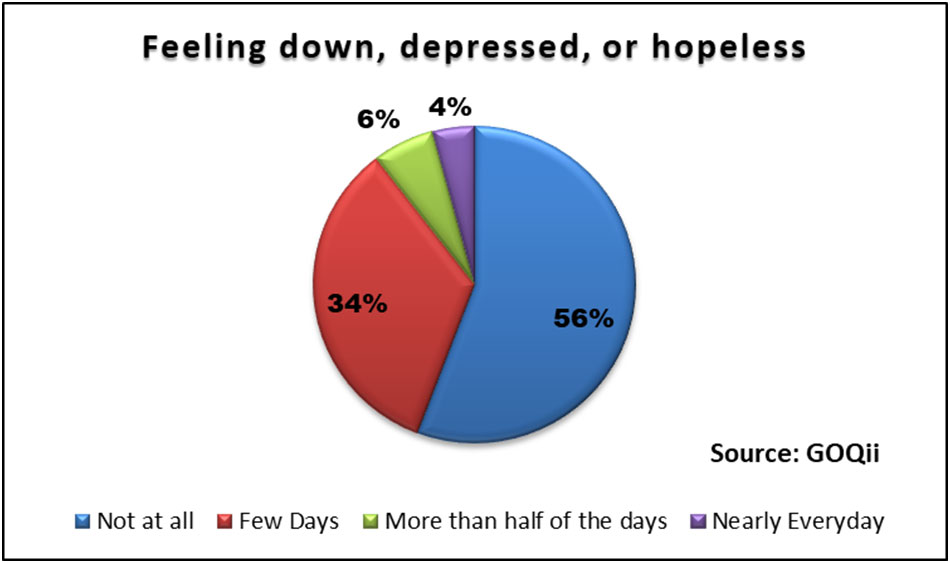
Out of the respondents, 56% of people don’t feel down, depressed, or hopeless as compared to the remaining 44% feel so. Approximately 10% feel down and depressed for more than half of the days or nearly every day.
More than 57% of the population feel tired or have little energy through at least some days in the past few weeks. At least more than 15% have this feeling more than half of the days. This leads to some people sleeping too much while some others have trouble sleeping. With the change in lifestyle, approximately half of the population is having trouble with their sleep. Which is another sign of feeling down? 7% of the population goes through this nearly every day while 33% experience it in a few days.
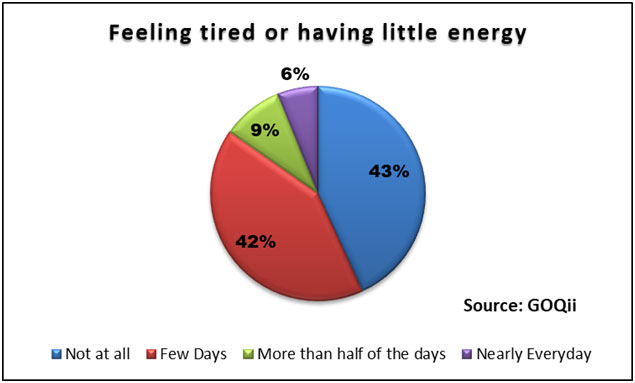
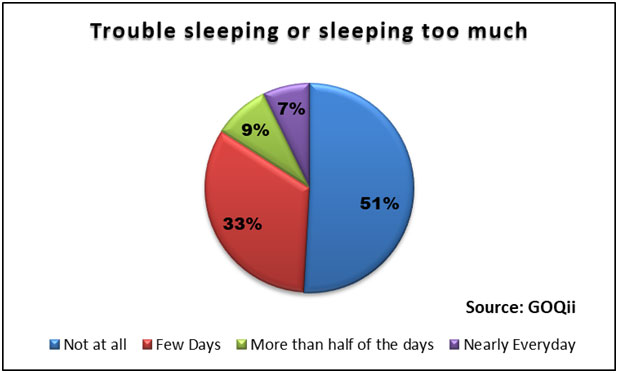

Vishal Gondal, Founder, and CEO, GOQii said, “Our study indicates that an increasing number of people across the country are dealing with mental health issues triggered by the spread of the coronavirus and the consequent lockdown. The mounting uncertainty is the basis of the high-stress index which can be controlled with a balanced diet, changes in lifestyle, and appropriate sleep patterns. We at GOQii believe that preventive healthcare is the future and the only viable, long-term solution given the huge load on the healthcare system in India. Mental health has a huge impact on physical health and overall quality of life, hence addressing it sooner with a healthy and wholesome lifestyle is the only way ahead.”
Exercising can lead to endorphins (the happy hormone) which can help with depression. The more depressed you are, the more likely you are to not workout. We see that people who are moderately depressed to severely depressed find it more difficult to work out regularly as compared to people who are not depressed. It is important to cajole yourself into doing more things that make you feel happier. 35% of the select population is unable to work out due to the effects of severe depression while 26% due to moderate symptoms.
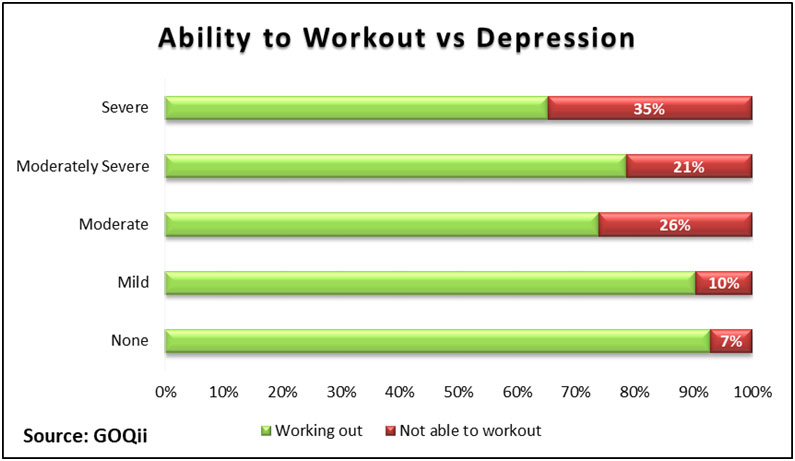
More often than not, people who are plagued by depression are more likely to try to feel better by eating out which constitutes 61% of the population. Most of the people who are moderate to severely depress eat from outside – more often at least once a week.
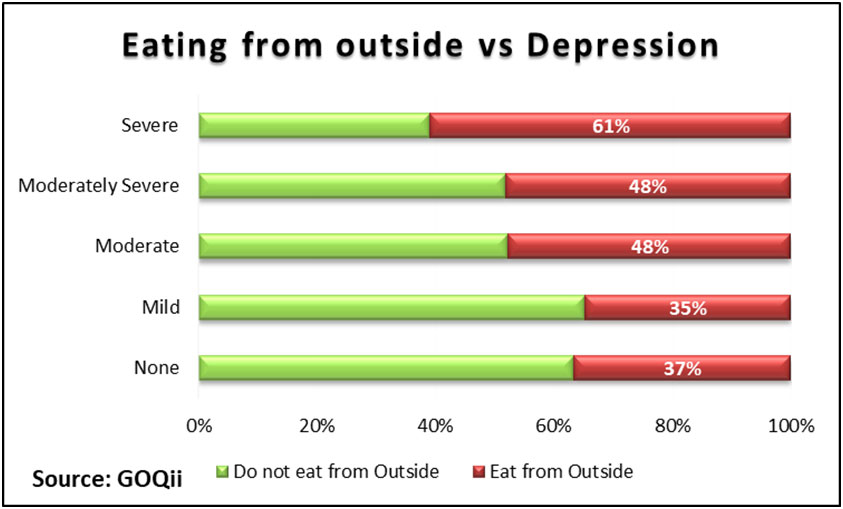
GOQii offers mental health solutions such as videos, counseling sessions, and access to mental health experts and coaches, available on GOQii play. This assists users in guided self-help, behavioral activation, and nutritional therapy that promotes mental health.

















